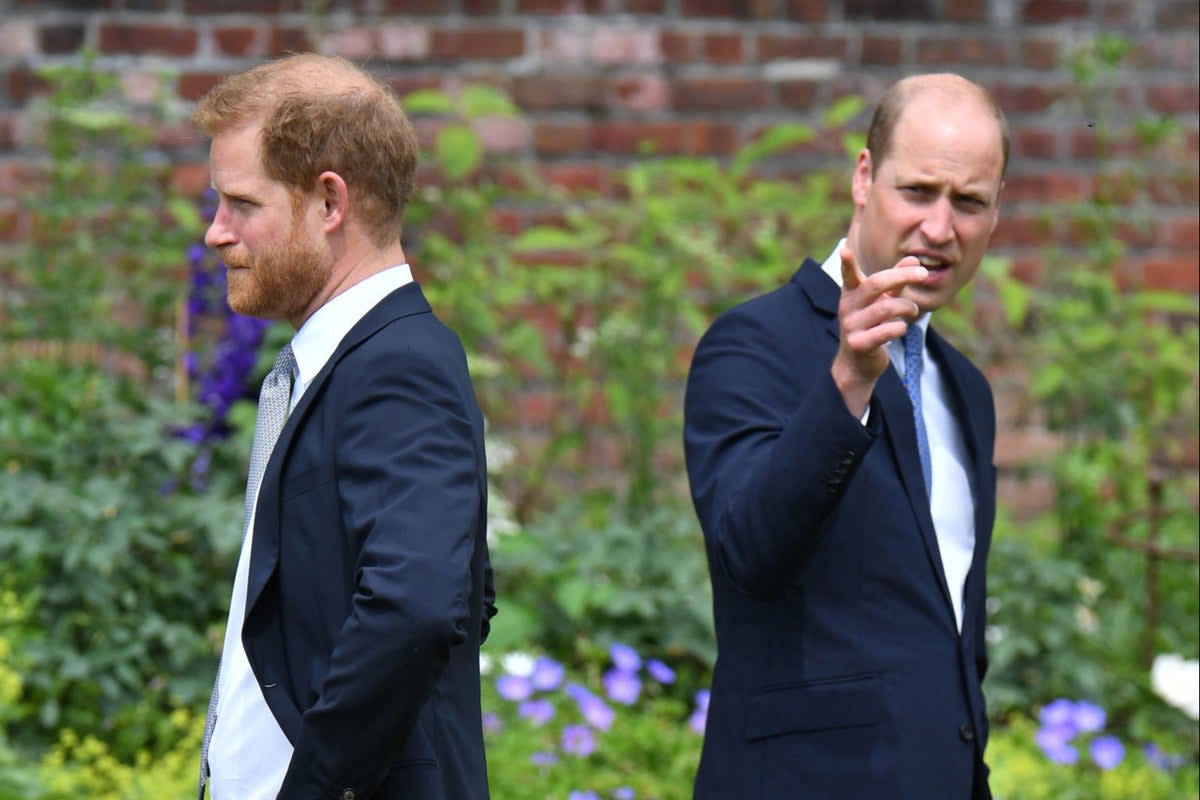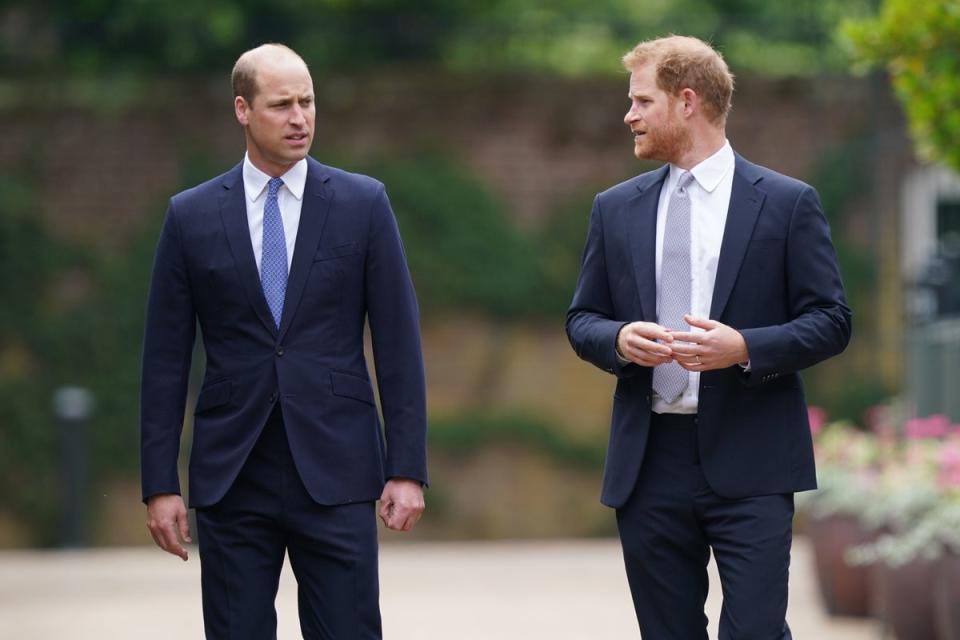How can siblings like William and Harry overcome family feuds when a parent has cancer?

Prince William and Harry currently face an unenviable situation. Their father, King Charles, was diagnosed with cancer earlier this week; now they must embark on the emotionally draining process of supporting a parent through illness. This scenario is difficult enough – it’s often the first time that roles are reversed, when you must take care of the person who’s always taken care of you. But what happens when this painful moment is made even more challenging by fraught sibling relationships?
This week, we’ve seen this uncomfortable dynamic play out in real time. Harry travelled back to the UK on Tuesday, making a 26-hour flying visit which included a 45-minute reunion with his father. He didn’t, however, meet with his older brother and his sister-in-law, the Princess of Wales (who is currently recovering from abdominal surgery). A rapprochement, it seems, is sadly off the table for now. Indeed, not much appears to have changed between the brothers since the release of Harry’s autobiography Spare dug an even greater gulf between them, making public details of their frosty relationship (like a now-infamous incident when Wills allegedly knocked his younger sibling backwards into a dog bowl).
Family crisis plus estrangement: royal or not, it’s certainly a tricky, painful mix. How can you provide support and potentially make tough decisions if you can’t stand to be in the same room as each other, let alone conduct a relatively civil conversation? Difficult life events – like serious illnesses, death and perhaps a financial crisis – are understandably emotive topics: they tend to provoke strong and often divergent feelings about how best to manage the situation, even if you’re already a close-knit family. “So if you add current disagreements into the mix [with] past scars and traumas and a historically difficult relationship, then it becomes a road of many bumps,” says accredited family mediator Louisa Whitney. “It’s hard to talk about how you all feel and what you might need to do if certain topics or thoughts feel very loaded,” she adds. “It means people focus more on avoiding the areas of tension rather than what discussions might need to be had.”
When siblings are estranged, family crises “can offer two alternative paths”, says BACP registered counsellor Georgina Sturmer. “It can reinforce our underlying feelings towards each other: our anger, jealousy, frustration or fear. Or it can allow us to gain perspective on the fragility of life, and encourage us to reconcile.” So should clashing siblings put their differences aside and create a united front during difficult times (like the Roy sibs in Succession)? Or is a crisis – with all its peaks and troughs of hurtful emotions – precisely the worst point to start trying to repair things (as it was for, erm, the Roy sibs, slightly later on in Succession)? The experts I speak to agree that there are no easy answers or shortcuts, or ways to foresee whether one outcome is more likely than the other. In her mediation work, Whitney has found that “some people will come together in the face of adversity but others will… use this as an opportunity to go over what led to [their] difficulties, consciously or subconsciously.”
Parents and siblings tend to be the people we’ve known for the longest time: they’ve had plenty more opportunities to annoy and disappoint us than others have, and those resentments can pile up, a geological formation of grievances. In tough times, we often find ourselves returning to those old feelings – and to our old selves. “What’s really important to recognise in any family is that we all revert to a particular kind of childhood stage,” says Susie Masterson, a BACP accredited psychotherapist. “When I say childhood, I mean anything from primary school age up to officially becoming an adult. You revert to a particular time when there was an unresolved conflict.” Sturmer agrees. “Family relationships have the capacity to pull our strings and trigger our ‘inner child’,” she says. “This can return us to painful emotions from the past, trigger old reactions [and] return us to our old childhood grudges and feelings.”
”The thing about family crises is that we don’t always handle them from what we might consider to be our ‘adult’ state,” Sturmer adds. In other words, if something went wrong in another area of our lives, we’d probably deal with it in a more mature, measured manner, “behaving in a rational, confident way and communicating what we need”. But with family, it’s much murkier – especially if your sibling is also your “arch nemesis”, as Harry so memorably branded William in Spare. “For people who’ve experienced childhood trauma, as [the brothers] have, it’s going to be a massive bag of fireworks on their shoulders, potentially,” Masterson suggests.
The thing about family crises is that we don’t always handle them from our ‘adult’ state
Georgina Sturmer, counsellor
The biggest decision that rowing siblings must make, Masterson says, is whether now is “the right time to delve into” their years of baggage, or whether the high emotions sparked by the crisis will just make those discussions more fraught. In that case, they might “need to put a sticking plaster on it for a bit”, acknowledging that their past is “too painful and stressful to deal with” right now. Couples’ therapy, she notes, doesn’t have to be between a romantic couple. She has worked with siblings in the wake of big life events like bereavement, and in this process, she often talks about making a “verbal contract” between the pair, who have to decide: “how can we act to get through a difficult situation, what will we do, what won’t we do”?
This, she says, “can be something that can easily be put in place without dealing with all the [past] stuff, the previous versions of ourselves” – it’s “a way to proceed as a team, working in a superficial way, rather than getting into the nitty-gritty”. In a similar vein, Whitney says that in her mediation work, “one of the questions [she] always ask[s] clients is ‘what does the other person do that particularly pushes your buttons or makes you react?’”, to avoid prodding potential sore spots. “Knowing this is really helpful in how you phrase things or how you approach the discussions you need to have.”

Boundaries, the experts agree, are crucial. “Managing the situation can mean not talking if you don’t need to, or only responding to messages when you feel able to rather than immediately,” suggests Whitney. In Masterson’s experience, meanwhile, sometimes putting these behavioural “contracts” in place ends up inadvertently improving a troubled sibling relationship. “Putting a few boundaries in place, [deciding on] ways of interacting, what they will and won’t do, could actually result in becoming less estranged,” she says. “It could be a foundation – they didn’t mean it to be, they thought it was crisis management. But it could actually become a foundation because you were heard, you spoke [about] your needs, you respected each other. That’s the first step towards repairing a relationship, because the landscape is different than it was before the crisis happened.”
And if it still feels hard to let old grudges slide, Sturmer suggests asking yourself a big question. “When you look back at your life, will you feel regret at the way that you behaved and the decisions that you made?” she asks. “This gut feeling, more than anything, is often a useful guide.”

